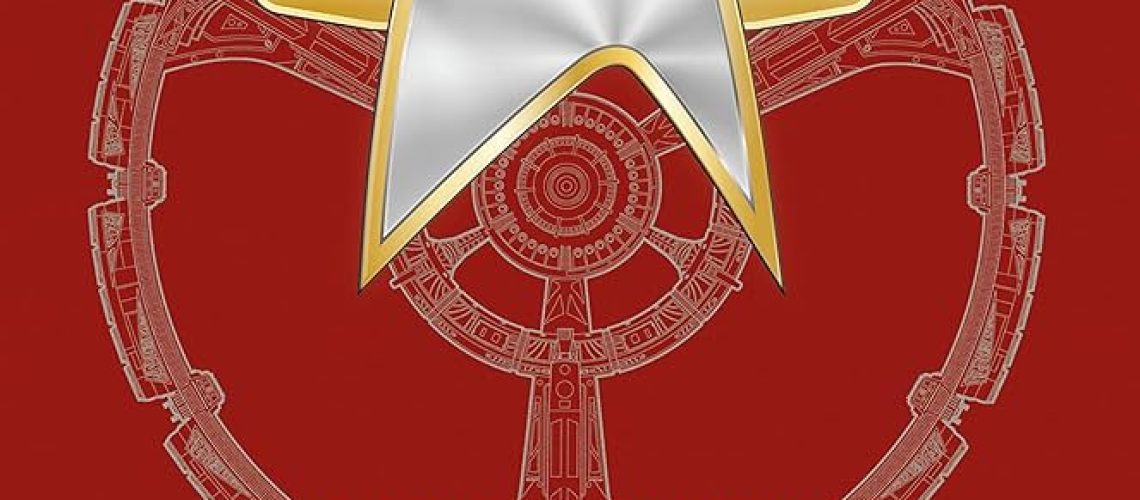While licensed Star Trek fiction novels have come out each year since Enterprise ended, things changed with the development of Discovery and subsequent Paramount+ series, particularly with the creation of Picard that destroyed the novel-based continuity that writers had built up and readers had enjoyed for years. This has been particularly rough for fans of Deep Space Nine (DS9). Since 2017, only one novel from that series has appeared, Alex White’s excellent Revanant in 2021.

The Autobiography of Benjamin Sisko, the fifth of an ‘autobiographical’ series that previously featured Kirk, Picard, Janeway, and Spock, offers one more DS9 publication to the starving. I normally wouldn’t be eager to read a story with this type of ‘autobiographical’ gimmick – no more than I’d want to read a novelization of already-existing media. I’d prefer a completely new DS9 story. However, being starved, I’m not going to pass up crumbs.
I’m now very glad that I did decide to read this; I’d encourage any other Star Trek fan who has read the licensed fiction to also check it out, even if one hasn’t seen all of DS9. Ardent fans of DS9 should particularly appreciate it. On the other hand, I wouldn’t recommend it to readers who have no familiarity with the series and its characters.
Of course, this ‘autobiography’ is really a novel, and the author of it is Derek Tyler Attico, a two-time winner of the Star Trek Strange New Worlds short story contest and contributing writer for the Star Trek Adventures role-playing game. Following the conceit of the series, Attico is credited in the book and its cover as the editor of the text.
Of the five Star Trek autobiographies released so far, Sisko’s sounds the most promising for offering something new to readers within the faux memoir format, certainly more than the cases of Kirk or Picard where so much already has already been shown or written about their lives. However, that format also presents a unique problem given what happens to Captain Ben Sisko in the final episode of the series. The character would have had little time (or reason) to write an autobiography prior to “What You Leave Behind”, and his subsequent existence with the Prophets now makes the endeavor difficult, at least in conventional ways of writing and publishing.
Attico solves this problem of authorship reasonably enough. One year following Ben Sikso’s disappearance, a communications packet bearing his authorization code, and addressed to his son Jake, comes out of the Celestial Temple wormhole. Separate from the normal flows of space and time, Sisko has recorded a message for his son to let him know that he is okay and to share memories he has never taken the time to relate and explain to his son before. Following a short introduction by Jake that relates the reception of this transmission, the transcription of Ben Sisko’s message are presented, with only one redaction and explanation that “some words between a father and son should remain private.”
Benjamin Sisko starts with his days growing up in New Orleans, isolated from the technology of the 24th century, conveniences that the city and Sisko’s family avoid as part of their dedicated preservation of a rich and authentic cultural heritage. We learn about his immediate ancestors and their role in African American history and culture, as well as his parents and grandparents. Though audiences frequently saw Ben’s father within the series and eventually learned about the wormhole-alien origin of his birth mother, we know less about the mother he knew and who raised him. The details in the early chapters of this novel that offer glimpses into his early familial life with siblings and the previous generations do a fantastic job at showing the foundational moments of tenderness and daring that formed the Sisko we know. An early tragedy in Sisko’s life and a promise to “live every day, don’t wait” sets him on a path of learning how to balance his heart and mind, his drive toward exploration and adventure with the sobering knowledge that actions have consequences that must be measured. And above all, his family teaches him to consider others and keep in mind that their relatively sheltered lives are both privilege and responsibility. And Sisko passes this instruction on to Jake:
“We’re both very fortunate, son.
We’ve both been raised in societies without oppression. We don’t know what it’s like to be condemned or ostracized because another group decides to declare you different or inferior. Sadly, there are people on worlds in the Alpha Quadrant that know all too well what that feels like. Humans on Earth used to be one of them. It’s taken us a long time to let go of the pettiness and fears of the past that were holding us back from grasping our future.
And even though we’re not like that anymore, I often wonder how much, or perhaps how little, it could take for us to turn on each other again. That’s why the lessons of the past need to be remembered to safeguard the future.”
With passages such as these, Attico demonstrates how brilliantly he captures the voice of Benjamin Sisko, via the interpretation and performances of Avery Brooks. Brooks’ voice as Sisko rings throughout the novel, both in tone and themes of family and racial/social justice. The relationship between Ben and his son Jake and a celebration of African American culture were central to Brooks’ involvement in DS9 and the focus of his passion and acting endeavors within the character of Benjamin Sisko. Attico wisely seizes this focus, offering his own perspectives without making it a simplistic or pale imitation.
Following the history of his early years, Ben relates his experiences entering Starfleet and his love/pursuit of engineering up to his first posting. These chapters feature the familiar scene where he first introduces himself to his future wife Jennifer on the beach, and it is nice seeing the full memories compared to the version seen in DS9 within the Celestial Temple. Life with Jennifer and the birth of Jake give way to the tragedy that sets him on the path to Bajor: the battle against the Borg at Wolf 359. Following the loss of Jennifer, Ben escapes into the Defiant project, before that gets shelved and he finds himself ordered to take command of the newly acquired Deep Space Nine. The final chapters then give Sisko’s perspective and thoughts on characters and key events from the course of the series. Within these last chapters, Attico continues to excel at offering unique details from Sisko’s perspective on familiar events or people. He particularly contrasts the Cardassians well against the principals that Ben Sisko was raised upon.
The middle of the novel features several nice cameos of familiar faces from the wider Star Trek universe. However, these middle chapters also house my only major criticism of the novel. There are not enough moments to detail the quiet moments between Benjamin, Sisko, and Jake to parallel the familial ties of the opening chapters. With the Ben – Jake relationship central to the very existence of this transmission ‘autobiography’, there are surprisingly few reflections on their lives together before Wolf 359. The novel could have benefited from another thirty to fifty pages to cover these reflections more. Along the same lines, I wish that the subtitle of the book, “The Life of Starfleet’s Legendary Captain and Emissary”, had found a way to simply include his most important title: father.
I really hope more DS9 fiction is forthcoming, but in the meantime, fans should enjoy Attico’s respectful and insightful take on the elements of the series that made it so beloved.







